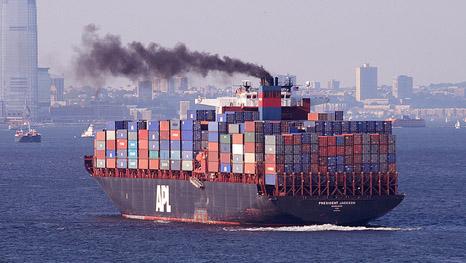Duplicity for decades

Can we seriously pretend to want more free trade, and at the same time, declare that we are working to preserve the environment? In February, 1992, European heads of state in Maastricht signed the founding treaty of the European Union – which, in accordance with its treaties, has since become the free-trade zone that is most open to importations – then in June of that same year, at the Earth Summit in Rio, recommended managing our planet’s resources better. By now, 90,000 cargo ships crisscross the seas, spewing 1 billion tons of CO2 a year into the atmosphere. According to a study carried out at the University of Rostock, ultrafine particles of sulfur lead to 60,000 premature deaths (caused by complications from asthma, lung cancer, cardiovascular disease, etc.) a year in the EU.
Similarly, the WTO included protecting the environment among its fundamental goals, but eliminated quotas on textile importations in 2005. Since then, the textile industry has moved up to second place amongst sectors producing the most pollutants – right behind the oil industry. According to a report “by the Ellen MacArthur Foundation” published on November 28, 2017 called “A New Textiles Economy: Redesigning fashion's future”, the equivalent of a garbage truck loaded with textiles is incinerated or thrown away every second. The waste in barely-worn clothes is close to $500 billion a year, and the 500,000 tons of microfiber waste that winds up in the sea each year is the equivalent of 50 billion plastic bottles.
New free-trade agreements will only contribute to deteriorating the environment even further. The projected creation between the USA and the EU of the largest, most-important free-trade zone in history, which would have represented nearly half of the world’s annual GDP (TTIP or TAFTA Transatlantic Free Trade Agreement), was laid to rest by Donald Trump’s inauguration as president of the USA in January, 2017. But in September, a new free-exchange treaty between Canada and the EU (CETA, for Comprehensive Economy and Trade Agreement) went into effect before it was even ratified. Another free-trade treaty, JEFTA (Japan-EU free trade agreement) was agreed to in December and should be coming into effect in early 2019. A free-exchange agreement may also be concluded soon between South American countries (Mercosur) and the EU.
Francis JOURNOT - "International Convention for a Global Minimum Wage"
http://www.international-convention-for-minimum-wage.org
Copyright © 2013 - 2018 - non profit NGO International Convention for a Global Minimum Wage & Francis Journot Fair Consulting - All rights reserved
Make a free website with emyspot - Signaler un contenu illicite sur ce site























